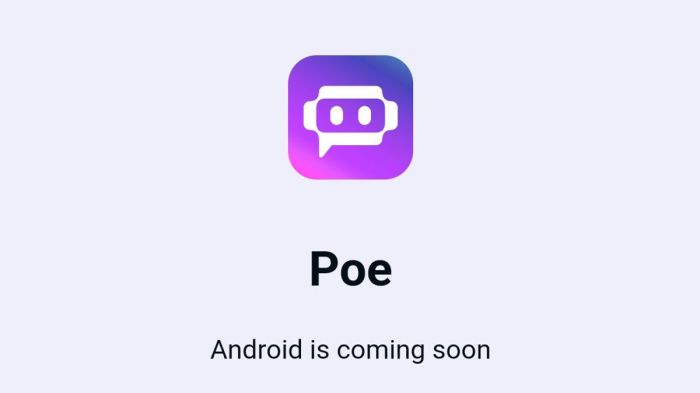Quora AI Poe Analysis dives into the exciting world of AI-powered question-and-answer platforms, exploring how Quora and Poe are shaping the future of online knowledge sharing. Imagine a world where your questions are answered instantly by intelligent algorithms, and your search results are tailored to your unique interests. This is the reality being built by platforms like Quora and Poe, and we’re here to break down how they’re doing it.
From analyzing the AI models that power these platforms to examining user interactions and potential future developments, this exploration delves into the intricate relationship between humans and AI in the quest for knowledge.
Quora and AI
Quora, the platform known for its question-and-answer format, has embraced artificial intelligence (AI) to enhance its operations and user experience. AI plays a crucial role in various aspects of Quora, from content moderation to personalized recommendations.
Content Moderation
AI algorithms are essential for maintaining a healthy and informative environment on Quora. They help identify and remove inappropriate content, including spam, hate speech, and harassment. These algorithms are trained on a massive dataset of user-generated content, enabling them to detect patterns and anomalies that signal problematic content. This automated process ensures that users can engage in meaningful discussions without encountering offensive or irrelevant material.
Question Answering
Quora’s AI algorithms power its question-answering capabilities, enabling users to find relevant and informative answers to their queries. These algorithms analyze the text of questions and identify relevant answers from its vast database of user-generated content. They also consider factors like answer quality, author expertise, and user engagement to rank answers and provide the most helpful results.
Personalized Recommendations
AI algorithms play a crucial role in providing personalized recommendations to users on Quora. By analyzing user activity, including questions asked, answers provided, and topics followed, these algorithms can suggest relevant content that aligns with individual interests. This personalized approach helps users discover new topics, connect with like-minded individuals, and engage in meaningful discussions.
Impact on User Experience
AI significantly impacts the user experience on Quora, enhancing search relevance, question suggestions, and answer quality.
Search Relevance
AI-powered search algorithms improve the relevance of search results by understanding the context and intent behind user queries. These algorithms consider factors like s, synonyms, and user history to deliver accurate and relevant results. This ensures users find the information they need quickly and efficiently.
Question Suggestions
Quora’s AI algorithms analyze user queries and suggest related questions that might be of interest. This helps users explore related topics and discover new perspectives.
Answer Quality
AI algorithms play a role in ensuring the quality of answers on Quora. They consider factors like answer length, clarity, and relevance to rank answers and highlight the most informative ones. This helps users find answers that are accurate, well-written, and provide valuable insights.
Comparison with Other Platforms
Quora’s approach to AI differs from platforms like Reddit and Stack Overflow in several ways.
Reddit relies heavily on community moderation, where users vote on content to determine its visibility and relevance. While AI plays a role in content moderation, it is not as central as in Quora. Reddit’s focus on user-driven content allows for a wider range of topics and discussions, including those that might be considered controversial or niche.
Stack Overflow
Stack Overflow, a platform for programmers, emphasizes technical accuracy and code-related questions. AI plays a role in identifying duplicate questions, recommending relevant answers, and flagging potential code issues. However, the platform relies heavily on user-generated content and expert contributions to maintain its high standards of technical accuracy.
In conclusion, AI is an integral part of Quora’s operations, enhancing content moderation, question answering, and personalized recommendations. AI significantly impacts the user experience, improving search relevance, question suggestions, and answer quality. While Quora’s approach to AI differs from other platforms like Reddit and Stack Overflow, it effectively enhances its user experience and fosters a vibrant community of knowledge seekers and contributors.
Poe and its AI Capabilities
Poe, a conversational AI platform developed by Quora, utilizes a diverse range of AI models to deliver a comprehensive and interactive user experience. These models, each with its unique strengths, contribute to Poe’s ability to engage in natural conversations, provide informative answers, and retrieve relevant information from a vast knowledge base.
AI Models Employed by Poe, Quora ai poe analysis
The various AI models employed by Poe, each contributing to its unique capabilities, are:
- Large Language Models (LLMs): LLMs, such as GPT-3, are at the core of Poe’s conversational abilities. These models are trained on massive datasets of text and code, enabling them to understand and generate human-like text, making conversations feel natural and engaging.
- Retrieval-Based Models: These models are designed to efficiently retrieve relevant information from a vast knowledge base. They analyze user queries and match them with appropriate information from a collection of documents, ensuring accurate and timely responses.
- Specialized Models: Poe also incorporates specialized AI models for specific tasks. These models, trained on specific domains like code generation, translation, or creative writing, enhance Poe’s versatility and allow it to provide tailored responses to diverse user needs.
Strengths and Weaknesses of Poe
Poe exhibits both strengths and weaknesses in its AI capabilities, contributing to its unique characteristics:
- Strengths:
- Natural Conversational Flow: Poe’s LLMs excel at generating human-like text, resulting in natural and engaging conversations. This makes interacting with Poe feel more like a dialogue with a knowledgeable friend rather than a rigid question-and-answer session.
- Informative Answers: The combination of LLMs and retrieval-based models enables Poe to provide informative and accurate answers to a wide range of questions. This is especially beneficial for users seeking information on various topics.
- Variety of Models: The diverse AI models employed by Poe, including specialized models for specific tasks, offer a wide range of functionalities. This makes Poe a versatile platform capable of handling various user requests, from simple questions to complex tasks.
- Weaknesses:
- Potential for Bias: Like all AI models, Poe’s responses can be influenced by biases present in the training data. This can lead to inaccurate or biased information, requiring careful evaluation of Poe’s outputs.
- Limited Contextual Understanding: While Poe excels at conversational flow, its contextual understanding can be limited, especially in long conversations. This can lead to inconsistencies or misinterpretations, particularly when the conversation shifts topics or involves complex reasoning.
- Dependence on Data: Poe’s knowledge is limited to the data it has been trained on. This means it may struggle with questions requiring real-time information or specialized knowledge beyond its training dataset.
Comparison with Kami and Bard
Poe’s AI capabilities can be compared and contrasted with other conversational AI platforms like Kami and Bard:
- Kami: Both Poe and Kami are powered by LLMs, resulting in natural conversational flow and the ability to generate creative text formats. However, Kami is primarily focused on text generation and may not be as adept at retrieving factual information as Poe.
- Bard: Bard, developed by Google, leverages Google’s vast knowledge base, making it a strong contender for information retrieval. While Bard may not be as conversational as Poe, its integration with Google Search provides access to a wider range of information.
User Interactions with Quora and Poe: Quora Ai Poe Analysis
Both Quora and Poe are platforms that rely heavily on user interactions to function and grow. Understanding how users engage with these platforms is crucial to appreciating their strengths and limitations.
Types of Questions and Answers
The types of questions and answers exchanged on Quora and Poe reflect the unique characteristics of each platform. On Quora, users ask and answer questions across a wide range of topics, from personal experiences to technical knowledge. Answers are often detailed and well-researched, reflecting the platform’s focus on providing comprehensive and informative content.
Poe, on the other hand, is designed for more conversational interactions. Users can ask questions in a natural language, and Poe’s AI responds with answers that are often more concise and less formal than those found on Quora. This difference in tone and style reflects the different purposes of each platform.
Role of User Feedback and Engagement
User feedback and engagement play a crucial role in shaping the development of both Quora and Poe. On Quora, user ratings and comments help to determine the quality of answers and identify the most helpful contributors. This feedback system helps to ensure that the platform remains relevant and informative.
Similarly, user interactions on Poe are used to train and improve the AI’s performance. As users ask questions and provide feedback, the AI learns to better understand their intent and generate more accurate and relevant responses. This continuous learning process is essential for Poe’s ongoing development.
Benefits and Challenges of Integrating Poe’s AI into Quora’s Ecosystem
Integrating Poe’s AI into Quora’s ecosystem could offer several benefits, including:
- Enhanced search capabilities: Poe’s AI could be used to improve Quora’s search engine, making it easier for users to find relevant answers to their questions.
- Improved question answering: Poe’s AI could be used to provide more comprehensive and informative answers to questions, even those that are open-ended or complex.
- Personalized content recommendations: Poe’s AI could be used to personalize content recommendations for users, based on their interests and past interactions with the platform.
However, integrating Poe’s AI into Quora’s ecosystem also presents some challenges:
- Maintaining the quality of answers: Ensuring that Poe’s AI generates accurate and reliable answers is crucial to maintaining the credibility of Quora’s platform.
- Addressing potential biases: AI systems can be susceptible to biases, which could lead to unfair or inaccurate results. It is important to address these biases before integrating Poe’s AI into Quora’s ecosystem.
- Balancing human and AI contributions: Striking a balance between human and AI contributions is essential to ensure that Quora remains a platform for both human expertise and AI-powered assistance.
Future Directions for Quora and Poe
Quora and Poe, powered by AI, are continuously evolving platforms. Their future hinges on leveraging advanced AI technologies and adapting to user feedback. The integration of these technologies can revolutionize the user experience and content creation on both platforms.
The Integration of Advanced AI Technologies
The integration of advanced AI technologies can significantly enhance Quora and Poe. Here are some potential developments:
- Personalized Content Recommendations: AI can analyze user preferences and interactions to deliver tailored content recommendations, improving user engagement and knowledge discovery.
- Enhanced Search Functionality: AI-powered search algorithms can understand complex queries and provide more relevant and accurate search results, making it easier for users to find the information they need.
- Automated Content Moderation: AI can be used to identify and remove harmful or inappropriate content, ensuring a safe and respectful online environment.
- AI-Assisted Content Creation: AI tools can assist users in generating high-quality content, providing suggestions, writing drafts, and even generating complete articles.
- Real-Time Translation: AI-powered translation tools can facilitate communication across language barriers, making it easier for users to access and share knowledge globally.
As AI continues to evolve, the integration of platforms like Poe into Quora’s ecosystem promises a more personalized and efficient experience for users. This convergence of technology and human interaction raises exciting possibilities for the future of online knowledge sharing. Will AI become our primary source of information, or will it simply enhance our ability to navigate the vast landscape of knowledge? Only time will tell, but one thing is certain: the journey is just beginning.
While you’re busy analyzing the latest developments in Quora’s AI, don’t forget to submit your side event at TechCrunch Early Stage 2024 here ! It’s a great opportunity to showcase your innovative ideas and connect with potential investors. Back to Quora AI, remember, the possibilities are endless with this technology, and it’s crucial to stay updated on the latest trends and advancements.
 Standi Techno News
Standi Techno News

